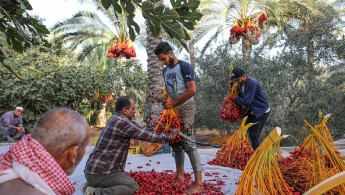Climate change causes havoc for Gaza's date harvest as farmers suffer major losses this season
Palestinian date farmers in the Israeli-blockaded coastal strip reported major financial losses in this year's date harvest season.
In separate remarks to The New Arab, several farmers said that they wait for the harvest season of date from year to year to gain some money that would help them keep their families afloat.
However, this year significant per cent of trees did not bear fruit, decreasing the number of dates able to enter the local markets.
"This year's harvest of date fruits has witnessed a decline in the production process by 40 per cent compared to previous seasons," Islam Abu Shuaib, Chairman of the Board of Directors of the Civil Society for Palm Development, told The New Arab.
In Gaza, the harvest season of dates starts in late September and lasts until the end of October.
"It started late this year," Mohammed Abu Maaza, a Gaza-based local farmer, said to The New Arab. "The main reason for this delay is climate change."
The 59-year-old father of seven explained that he used to pollinate his 450 palm trees at the beginning of March when the weather a little bit mild and not be rainy.
"Unfortunately, I did not have the chance to do that as the winter season continued until late April," the farmer recalled, noting that he pollinated his trees later, but he was not sure that his trees will be fruitful.
"I have gained nothing (...) I am only trying to pay the wages of my 15 workers who do not have any other job opportunities," he said, adding that he is "afraid to deduct parts of his workers' fees."
Salim al-Karafna, another farmer from Biet Hanoun in the north of the coastal enclave, expressed his fears of losing the harvest season and being unable to make some profits.
"This year is the worst one for a long time (...) until last year, all the Gazans, including farmers, workers and people, were awaiting for this unique time as our palm trees would fruitful with various kinds of dates," the 65-year-old father of 12 told The New Arab.
"However, neither my trees bear enough fruits or the local population is interested in buying dates as they think that all the current season crops of dates are not good," he remarked.
Abu Maaza and al-Kafarna estimated their losses to be at least US$ 10,000. They also blamed Hamas-run local authorities for allowing the traders to import dates from abroad, further weakening the ability to market the local product.
They called on the Hamas-run agriculture ministry, the International Committee of the Red Cross and the Food and Agriculture Organization of the United Nations "FAO" to support the palm sector and farmers in the strip and protect the upcoming harvest seasons.
In Gaza, there is about 12,000 dunam of agricultural lands of palm trees, while about 8,500 dunams are fruitful, and the rest are unproductive, according to the Hamas-run agriculture ministry.
Adham al-Bassiouni, the ministry's media spokesman, told The New Arab that "the dates' production has been hit by a significant decline this year," and that the ministry is expecting that the coastal enclave would produce at most 10,000 tons of dates compared to 15,000 tons in previous years.
"The farmers were shocked when they realized that they lost the time pollination date fruits in March, which caused damage to their palm tree," al-Basiouny said.
He added that the ministry adopted a pioneer and strategic plan to protect the palm trees in the next season, noting that the ministry's staff will contact farmers and implement dozens of workshops to teach them how to overcome their unprecedented problem.





 Follow the Middle East's top stories in English at The New Arab on Google News
Follow the Middle East's top stories in English at The New Arab on Google News
![Both Hamas and the Palestinian Authority welcomed the ICC arrest warrants [Getty]](/sites/default/files/styles/image_330x185/public/2024-11/GettyImages-2178351173.jpg?h=199d8c1f&itok=TV858iVg)

